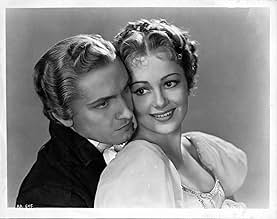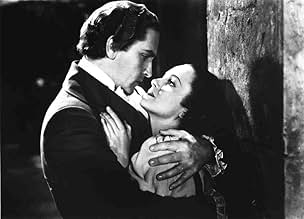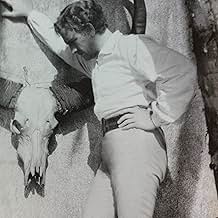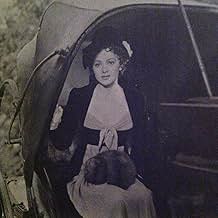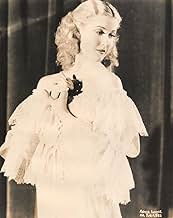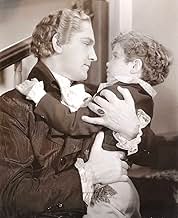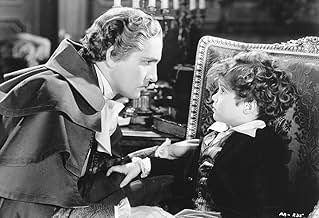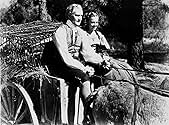Anthony Adverse
- 1936
- Tous publics
- 2h 21m
IMDb RATING
6.3/10
2.1K
YOUR RATING
In 18th-century Italy, an orphan's debt to the man who raised him threatens to separate him forever from the woman he loves.In 18th-century Italy, an orphan's debt to the man who raised him threatens to separate him forever from the woman he loves.In 18th-century Italy, an orphan's debt to the man who raised him threatens to separate him forever from the woman he loves.
- Won 4 Oscars
- 8 wins & 3 nominations total
Featured reviews
Fredric March stars as the title character, an orphan boy discarded due to his illegitimacy, who overcomes much adversity throughout his life. He is raised in a convent and adopted by a wealthy merchant, Edmund Gwenn, at the age of ten. He learns the business, but is shipped to Havana around the time of the French Revolution. Before he departs, it is learned that he has married the daughter of a servant, Olivia DeHavilland. He is thought lost at sea by all, but is actually in Africa running a slave trade, with his heart blackening the whole time. From there, the tale takes many twists as Anthony must find goodness in his heart again, and DeHavilland may be the key. The drama is a bit heavy-handed and some overacting is present. Claude Rains and Gale Sondergaard make great antagonists, and Sondergaard won a Best Supporting Actress Oscar for her performance.
Frederic March is "Anthony Adverse" in this 1936 film that also stars Olivia de Havilland, Claude Rains, Anita Louise Gail Sondergaard, Donald Woods, Edmund Gwenn and Louis Hayward.
Anita Louise and Hayward both have small roles as illicit lovers in the beginning of the film - she's married to Marquis de Luis (Claude Rains) and dies giving birth to a son by Denis (Hayward). The evil marquis drops the baby off at a convent, where he lives until he is 10 years old. Then he is adopted by a merchant, Mr. Bonnyfeather (Gwenn), who happens to be his grandfather.
Bonnyfeather sees his daughter in the boy's (Billy Mauch) angelic face. This beautiful little boy grows up to be a blond Frederic March, who has been given the name Anthony Adverse. He's in love with Angela (de Havilland), an aspiring opera singer, but goes to Africa to recover his grandfather's fortune rather than stay with her. There he becomes involved in slave trading. When he returns, things have changed for Angela - and for him.
The film is based on a best-selling book, and I have to agree that both the film and the book seem forgotten today, as is the director, Mervyn Leroy. March is wrong for the role - he doesn't convey enough charisma, for one thing - certainly Brian Aherne or Errol Flynn would have been much more compelling. March was a wonderful actor but he needed a strong director to get him away from being "stagy," and this type of role was never his métier anyway.
The gorgeous ingénue de Havilland gives a lovely performance, but the standouts are the villains - Sondergaard, as Bonnyfeather's housekeeper and Claude Rains as the marquis.
TCM gives this movie very high stars, probably based on the fact that it won four Oscars (one for Sondergaard who doesn't do much but look snide) and that it was nominated for Best Picture in 1936. The pickings must have been slim.
This is a good film, with an exciting carriage chase in the mountains and some brutal scenes of slave trading, but it's hard to keep interested in it. Adverse isn't terribly likable, for one thing. It's the story of a man and how he is molded into a human being by two priests and a woman. It's a lofty idea that doesn't quite make it onto the screen.
Anita Louise and Hayward both have small roles as illicit lovers in the beginning of the film - she's married to Marquis de Luis (Claude Rains) and dies giving birth to a son by Denis (Hayward). The evil marquis drops the baby off at a convent, where he lives until he is 10 years old. Then he is adopted by a merchant, Mr. Bonnyfeather (Gwenn), who happens to be his grandfather.
Bonnyfeather sees his daughter in the boy's (Billy Mauch) angelic face. This beautiful little boy grows up to be a blond Frederic March, who has been given the name Anthony Adverse. He's in love with Angela (de Havilland), an aspiring opera singer, but goes to Africa to recover his grandfather's fortune rather than stay with her. There he becomes involved in slave trading. When he returns, things have changed for Angela - and for him.
The film is based on a best-selling book, and I have to agree that both the film and the book seem forgotten today, as is the director, Mervyn Leroy. March is wrong for the role - he doesn't convey enough charisma, for one thing - certainly Brian Aherne or Errol Flynn would have been much more compelling. March was a wonderful actor but he needed a strong director to get him away from being "stagy," and this type of role was never his métier anyway.
The gorgeous ingénue de Havilland gives a lovely performance, but the standouts are the villains - Sondergaard, as Bonnyfeather's housekeeper and Claude Rains as the marquis.
TCM gives this movie very high stars, probably based on the fact that it won four Oscars (one for Sondergaard who doesn't do much but look snide) and that it was nominated for Best Picture in 1936. The pickings must have been slim.
This is a good film, with an exciting carriage chase in the mountains and some brutal scenes of slave trading, but it's hard to keep interested in it. Adverse isn't terribly likable, for one thing. It's the story of a man and how he is molded into a human being by two priests and a woman. It's a lofty idea that doesn't quite make it onto the screen.
I just watched the Warner Archive DVD-R of this movie last night. I want to say that it is a good movie and much underrated by the IMDb score of 6.6. It deserves at least a 7.6; I give it an 8.
It is beautifully filmed, the sets are gorgeous, and the cast of actors is stellar and does a good job with the material. Even the players with smaller roles are well-known actors, and they deliver their short moments with just the right emphasis. If you're an old film fan, you can't watch the movie without seeing a score of faces that you know and love.
The two main complaints I see here are that Fredric March is too old to play a convincing lover for De Havilland, and that the movie is somewhat pedestrian and dragging.
On the first point, yes, in some scenes the age difference in visible, but in others, March is made up to look younger than his biological age, and is convincing as a younger man. But the key thing is that March is *good* in the role. If you overlook the physical signs of his age, and concentrate on his characterization, delivery, etc., you can see he is acting thoughtfully, trying to do justice to his complex character. I think it's an excellent performance.
Pedestrian and dragged-out? Well, the film is long, as these epic-type films tend to be. Yet I did not find that my interest flagged. The film deals with years of the lives of these characters, and it needs to be long to get in all the complex background of European history and the changes in the lives of the characters (not to mention the important back-story of Anthony's birth).
One more thing: some commenters thought that Gale Sondergaard did little to earn her Oscar for this one. I thought she was very good. Normally she plays the sinister villainess in a very broad manner that telegraphs how evil and sinister she is; in fact, she was often hired because she was so good at that kind of thing (see her many Universal horror and mystery films). Here, she shows a bit of that sinister character, but underplays it greatly, to very good effect. She would never have earned an Oscar had she played the role in her heavy Universal style. I think it's the subtlest performance I've seen her give.
The sound on the Archives DVD-R is at first a tiny bit harsh, especially the booming orchestra with the grand Korngold score; this I noticed especially near the beginning of the film, and was worried it would spoil the film for me. However, the sound seemed to become a bit gentler about 10 or 15 minutes into the movie -- or maybe I just got used to it. But the volume of characters's speeches was definitely a bit uneven in the first few minutes. That happens, with movies this old. Perfect prints are rare, and DVDs reflect the imperfections. Overall, however, the DVD was quite watchable and the audio was clear and adequate.
I recommend this as a historical epic. Not one the greatest epics, to be sure, but quite a good one, and admirably executed. Maybe not a must-see, but certainly nothing you will regret seeing. I will watch it more than once, I think.
It is beautifully filmed, the sets are gorgeous, and the cast of actors is stellar and does a good job with the material. Even the players with smaller roles are well-known actors, and they deliver their short moments with just the right emphasis. If you're an old film fan, you can't watch the movie without seeing a score of faces that you know and love.
The two main complaints I see here are that Fredric March is too old to play a convincing lover for De Havilland, and that the movie is somewhat pedestrian and dragging.
On the first point, yes, in some scenes the age difference in visible, but in others, March is made up to look younger than his biological age, and is convincing as a younger man. But the key thing is that March is *good* in the role. If you overlook the physical signs of his age, and concentrate on his characterization, delivery, etc., you can see he is acting thoughtfully, trying to do justice to his complex character. I think it's an excellent performance.
Pedestrian and dragged-out? Well, the film is long, as these epic-type films tend to be. Yet I did not find that my interest flagged. The film deals with years of the lives of these characters, and it needs to be long to get in all the complex background of European history and the changes in the lives of the characters (not to mention the important back-story of Anthony's birth).
One more thing: some commenters thought that Gale Sondergaard did little to earn her Oscar for this one. I thought she was very good. Normally she plays the sinister villainess in a very broad manner that telegraphs how evil and sinister she is; in fact, she was often hired because she was so good at that kind of thing (see her many Universal horror and mystery films). Here, she shows a bit of that sinister character, but underplays it greatly, to very good effect. She would never have earned an Oscar had she played the role in her heavy Universal style. I think it's the subtlest performance I've seen her give.
The sound on the Archives DVD-R is at first a tiny bit harsh, especially the booming orchestra with the grand Korngold score; this I noticed especially near the beginning of the film, and was worried it would spoil the film for me. However, the sound seemed to become a bit gentler about 10 or 15 minutes into the movie -- or maybe I just got used to it. But the volume of characters's speeches was definitely a bit uneven in the first few minutes. That happens, with movies this old. Perfect prints are rare, and DVDs reflect the imperfections. Overall, however, the DVD was quite watchable and the audio was clear and adequate.
I recommend this as a historical epic. Not one the greatest epics, to be sure, but quite a good one, and admirably executed. Maybe not a must-see, but certainly nothing you will regret seeing. I will watch it more than once, I think.
Hervey Allen's great blockbuster novel Anthony Adverse, a major seller during the Depression Years provided both its leads, Fredric March and Olivia DeHavilland with some choice roles in their respective careers. The book turned out to be a one hit wonder for its author, but it certainly allowed him to live comfortably. Something like that other blockbuster novel Gone With the Wind did for its author which also gave Olivia DeHavilland an even bigger role in her career.
Imagine if you will a Charles Dickens hero like Pip or David Copperfield born in very humble circumstances, but escaping to lead a life of high adventure away from the Dickensian settings of Victorian Great Britain and you've got Anthony Adverse. The supporting characters in the book and film could have also come from Dickens.
Young Anthony is the product of an affair between a young officer, Louis Hayward, and the wife of a Spanish diplomat, Anita Louise. Husband Claude Rains kills Hayward in a duel and when his wife dies in childbirth, leaves the infant at a convent. The nuns give him the name of Anthony Adverse as the boy arrives on St. Anthony's Day and is a child of adversity if there ever was one.
The grown up Anthony, played by Fredric March is apprenticed to his maternal grandfather Edmund Gwenn who does not know it as doesn't March at first. A sly and cunning housekeeper, Gale Sondergaard in her screen debut, puts the puzzle together, but she's got an agenda of her own which later meshes with the dissipated and dissolute Rains.
March also falls for young Olivia DeHavilland who is an aspiring opera singer who also wants some of the finer things in life. Though they marry and have a son, both take different paths on a quest for material security and comfort.
Anthony Adverse was a good follow up role for Olivia DeHavilland after Captain Blood. In both she's a crinolined heroine which she was destined to be cast as in her career at Warner Brothers. Still this part has a lot more to it than most of those she was doing at that time in her career.
March was 39 when he made Anthony Adverse, still he's a good enough player to gradually age into the part. The story does take place over a long period of years, right into the Napoleonic era from 1773 when Anthony is born.
Edmund Gwenn's character is pure Dickens, the Scot's merchant John Bonnyfeather (even the name) could easily have been Fezziwick from A Christmas Carol. Gale Sondergaard as the housekeeper could have been the bloodless Jane Murdstone combined with the vengeful Madame DeFarge.
Sondergaard won the first Best Supporting Actress Oscar given out for her performance. It set a pattern of villainous female roles which she played until she got blacklist troubles in the late Forties.
The novel was a lengthy one and Warner Brothers should have had something as long as Gone With the Wind in order to be really faithful to the book. Jack Warner didn't want to take a chance, but he did get a product that caught all the main points the author was trying to make.
Even today with it's magnificent Erich Wolfgang Korngold score which also won an Oscar and its photography by Tony Gaudio, also a winner Anthony Adverse holds up very well for today's audience. Fans of March and DeHavilland should love it as will others.
Imagine if you will a Charles Dickens hero like Pip or David Copperfield born in very humble circumstances, but escaping to lead a life of high adventure away from the Dickensian settings of Victorian Great Britain and you've got Anthony Adverse. The supporting characters in the book and film could have also come from Dickens.
Young Anthony is the product of an affair between a young officer, Louis Hayward, and the wife of a Spanish diplomat, Anita Louise. Husband Claude Rains kills Hayward in a duel and when his wife dies in childbirth, leaves the infant at a convent. The nuns give him the name of Anthony Adverse as the boy arrives on St. Anthony's Day and is a child of adversity if there ever was one.
The grown up Anthony, played by Fredric March is apprenticed to his maternal grandfather Edmund Gwenn who does not know it as doesn't March at first. A sly and cunning housekeeper, Gale Sondergaard in her screen debut, puts the puzzle together, but she's got an agenda of her own which later meshes with the dissipated and dissolute Rains.
March also falls for young Olivia DeHavilland who is an aspiring opera singer who also wants some of the finer things in life. Though they marry and have a son, both take different paths on a quest for material security and comfort.
Anthony Adverse was a good follow up role for Olivia DeHavilland after Captain Blood. In both she's a crinolined heroine which she was destined to be cast as in her career at Warner Brothers. Still this part has a lot more to it than most of those she was doing at that time in her career.
March was 39 when he made Anthony Adverse, still he's a good enough player to gradually age into the part. The story does take place over a long period of years, right into the Napoleonic era from 1773 when Anthony is born.
Edmund Gwenn's character is pure Dickens, the Scot's merchant John Bonnyfeather (even the name) could easily have been Fezziwick from A Christmas Carol. Gale Sondergaard as the housekeeper could have been the bloodless Jane Murdstone combined with the vengeful Madame DeFarge.
Sondergaard won the first Best Supporting Actress Oscar given out for her performance. It set a pattern of villainous female roles which she played until she got blacklist troubles in the late Forties.
The novel was a lengthy one and Warner Brothers should have had something as long as Gone With the Wind in order to be really faithful to the book. Jack Warner didn't want to take a chance, but he did get a product that caught all the main points the author was trying to make.
Even today with it's magnificent Erich Wolfgang Korngold score which also won an Oscar and its photography by Tony Gaudio, also a winner Anthony Adverse holds up very well for today's audience. Fans of March and DeHavilland should love it as will others.
Fredric March, usually such a fine actor, was unable to give more than a wooden performance in the title role of 'Anthony Adverse'. Warner Bros. would have been better off using their up-and-coming new star, Errol Flynn, for this one--giving us the chance to see him paired once again with Olivia de Havilland. There are no sparks between March and de Havilland--he seems too old for the role despite clever make-up attempts to make him look suitable. But aside from the fact that he is miscast, there is a lot to admire about the film itself. For one thing, Claude Rains and Gale Sondergaard make the most memorable pair of villains ever seen in a 1930s movie. The sequence where they cause a coach and driver to go off a cliff is given an extra punch by their dialog. "He was my favorite coachman," says Rains dryly. "The coach was rather handy too," quips Sondergaard. Giving other outstanding performances are Edmund Gwenn, Louis Hayward, Anita Louise, Donald Woods and Akim Tamiroff. Some of the acting styles seem dated, as are the titles that connect the time span. The best-seller was a bulky 1,200 pages from which the scriptwriter trimmed the story down considerably, excluding whole segments of the book and still ending up with a film well over two hours. Strange how the celebrated novel is barely remembered today. The opera scenes with Olivia de Havilland are interesting. She was a radiant young beauty at the time but could have used a better technique in her lip sync to the lyrics. Interesting historical drama of the Napoleonic era with Rains and Sondergaard giving the best performances. I've written articles on both of them for CLASSIC IMAGES, inspired by their performances in this film.
Did you know
- TriviaGale Sondergaard made her film debut in "Anthony Adverse" and won an Academy Award in the brand-new category of Best Supporting Actress.
- GoofsDuring the duel between Don Luis and Denis Moore, the sword wielded by Moore was "unbated", i.e. his fencing foil was blunted with a protective guard on the tip.
- Quotes
[first title card]
Title Card: Those who are destined to live during times of war and social upheaval are victims of cruel fate ~~ unable to find comfort in the past or peace in the present. They are the spiritual orphans of the world.
- ConnectionsFeatured in The Making of a Great Motion Picture (1936)
- SoundtracksI'll Wait For You My Love (Angela's Song)
(uncredited)
Composer: Erich Wolfgang Korngold
Lyrics by Howard Koch (uncredited)
Sung by Carol Ellis (uncredited)
- How long is Anthony Adverse?Powered by Alexa
Details
- Release date
- Country of origin
- Languages
- Also known as
- Anthony Adverse, marchand d'esclaves
- Filming locations
- Production company
- See more company credits at IMDbPro
Box office
- Budget
- $1,050,500 (estimated)
- Runtime2 hours 21 minutes
- Color
- Sound mix
- Aspect ratio
- 1.37 : 1
Contribute to this page
Suggest an edit or add missing content



